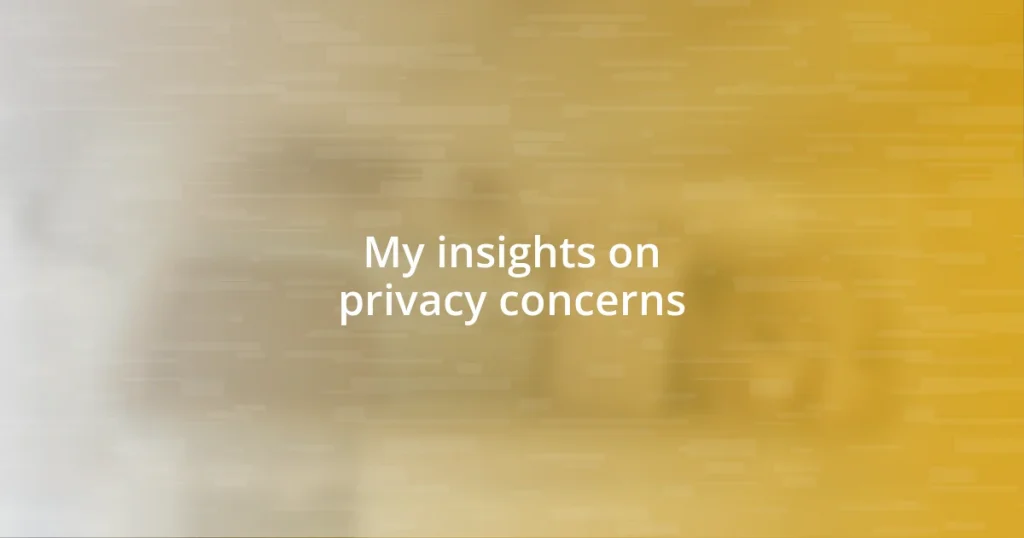Key takeaways:
- Rapid technological advancements have heightened privacy concerns and emphasized the importance of personal data protection to prevent identity theft and maintain privacy.
- Common online privacy threats include phishing scams, unsecured Wi-Fi networks, and data tracking cookies, all of which require user vigilance and proactive security measures.
- Future trends indicate a focus on data transparency, privacy as a competitive advantage for businesses, and the complex relationship between privacy and emerging artificial intelligence technologies.
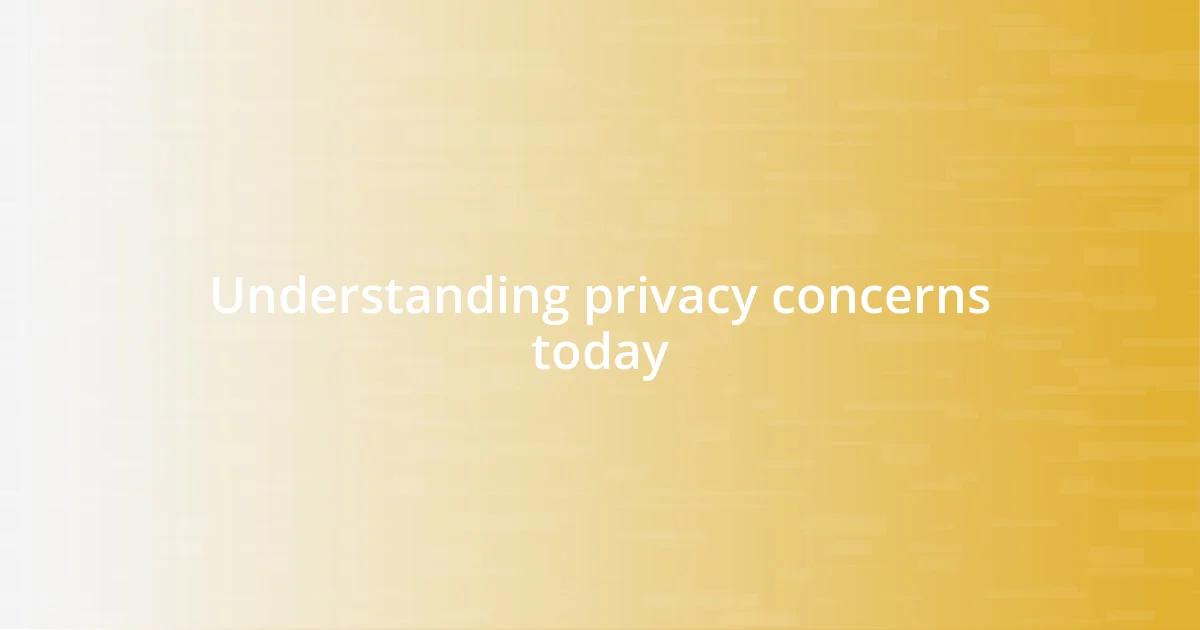
Understanding privacy concerns today
In recent years, the rapid advancement of technology has significantly amplified privacy concerns. I often find myself reflecting on the irony of sharing personal moments on social media, only to realize later how vulnerable that makes me feel. Isn’t it unsettling to think that our digital footprint can be tracked so easily?
As I navigate online spaces, I can’t help but feel an emotional tug regarding data collection. Just last month, I received a targeted ad for a product I casually mentioned in a conversation. It made me question how much companies really know about me and raised a deep-seated concern about consent—am I, in fact, giving away my privacy without even knowing it?
Moreover, the recent rise in data breaches has only heightened my anxiety. I still remember the panic I felt when my information was compromised in a massive hack last year. It made me acutely aware of how crucial it is to stay informed about where my data goes and to routinely check my security settings. Isn’t it essential for all of us to take proactive steps to protect our digital selves?
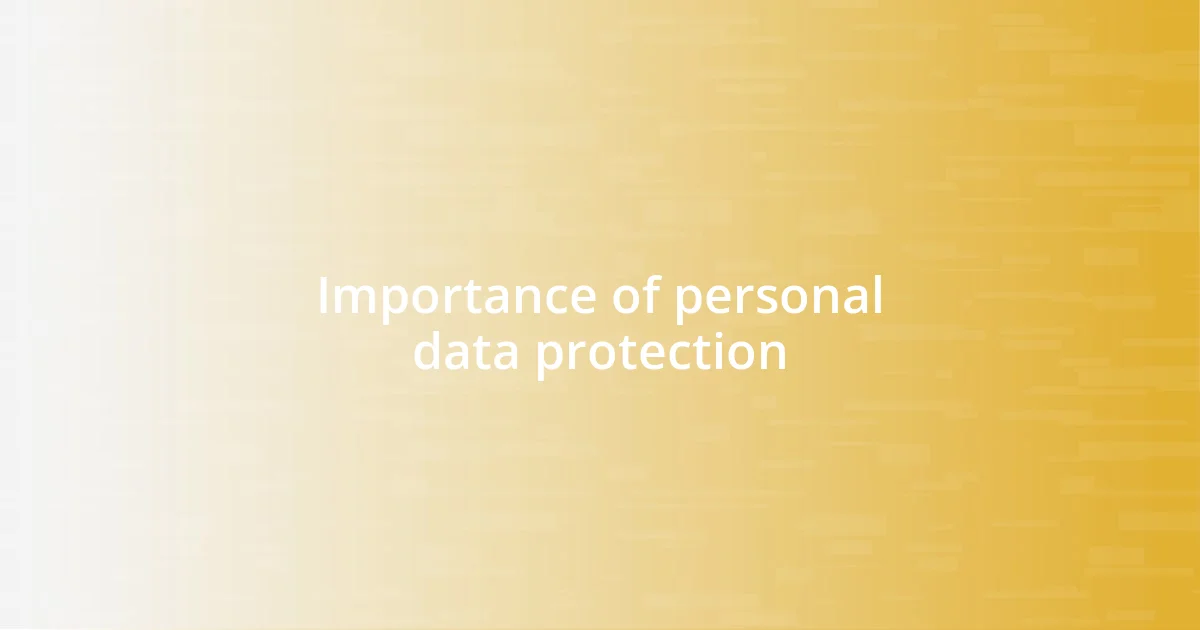
Importance of personal data protection
The importance of personal data protection cannot be overstated. I’ve seen firsthand how the misuse of personal information can lead to devastating consequences. A friend of mine experienced identity theft after her data was leaked due to a company’s negligence. It shook her world, making her feel vulnerable and violated. This incident really hit home for me, illustrating just how deeply our sense of security is tied to how well our data is safeguarded.
To highlight why protecting personal data is essential, consider these key points:
– Safeguarding identity: Protecting our data helps prevent identity theft, which can disrupt lives and finances.
– Maintaining privacy: Personal data protection ensures that our private lives remain personal, shielding us from unwanted surveillance.
– Empowering individuals: When we control our data, we feel a sense of ownership that fosters trust in digital platforms.
– Preventing misuse: Strong data protection measures can deter malicious actors from exploiting sensitive information for harmful purposes.
– Promoting transparency: Organizations that prioritize data protection cultivate a culture of transparency, fostering stronger relationships with users.
Ultimately, these insights collectively highlight that by taking data protection seriously, we are not just protecting ourselves—we’re also advocating for a safer digital environment for everyone.
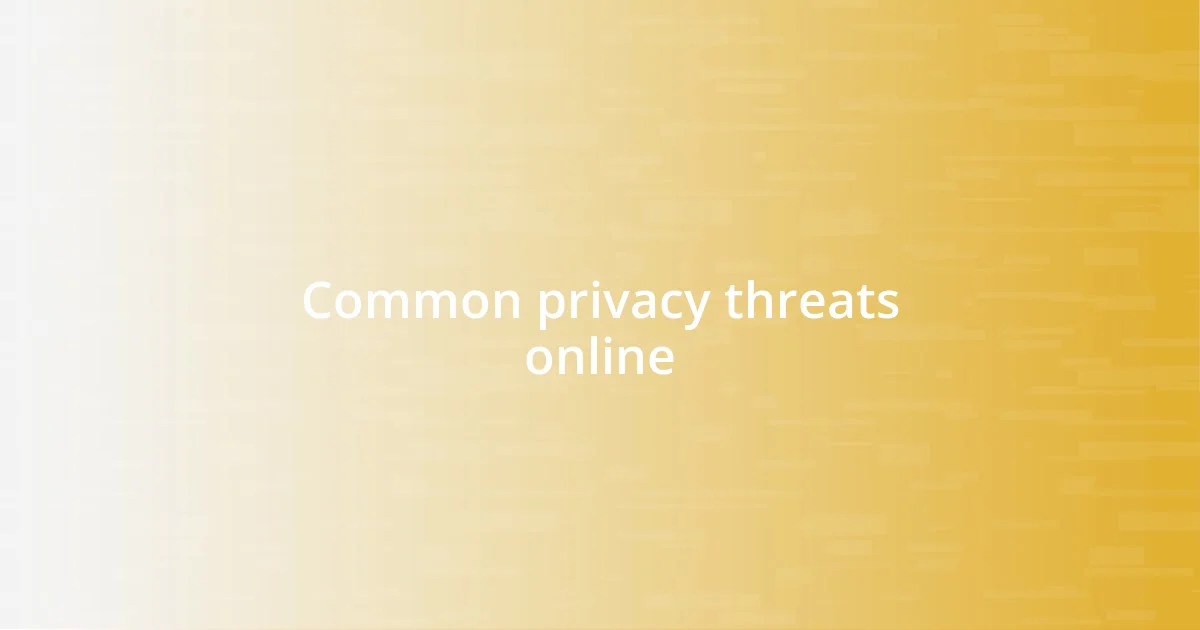
Common privacy threats online
When we explore common privacy threats online, one glaring issue is phishing scams. These deceptive emails or messages trick users into providing sensitive information like passwords or credit card numbers. I once clicked on a seemingly innocent link that led to a website asking for my personal details. I couldn’t believe how easily I almost fell victim to such a simple but effective ploy.
Another significant threat comes from unsecured Wi-Fi networks. Whenever I find myself in a café or airport, I often hesitate before connecting to the free Wi-Fi. It’s alarming to think that hackers could intercept my data without me even realizing it. Just last week, I overheard someone sharing their online banking details over an unprotected network, and it made my skin crawl.
Lastly, data tracking cookies present a threat that many overlook. While they can enhance our browsing experience, they also collect an alarming amount of personal information. After researching this topic, I took the time to delete all stored cookies in my browser. It was a small but vital step toward reclaiming a bit of my online privacy that I didn’t fully understand I was losing.
| Privacy Threat | Description |
|---|---|
| Phishing Scams | Deceptive messages that trick users into revealing sensitive information. |
| Unsecured Wi-Fi Networks | Public networks that expose users to potential data interception by hackers. |
| Data Tracking Cookies | Cookies that collect personal information, often without user consent. |
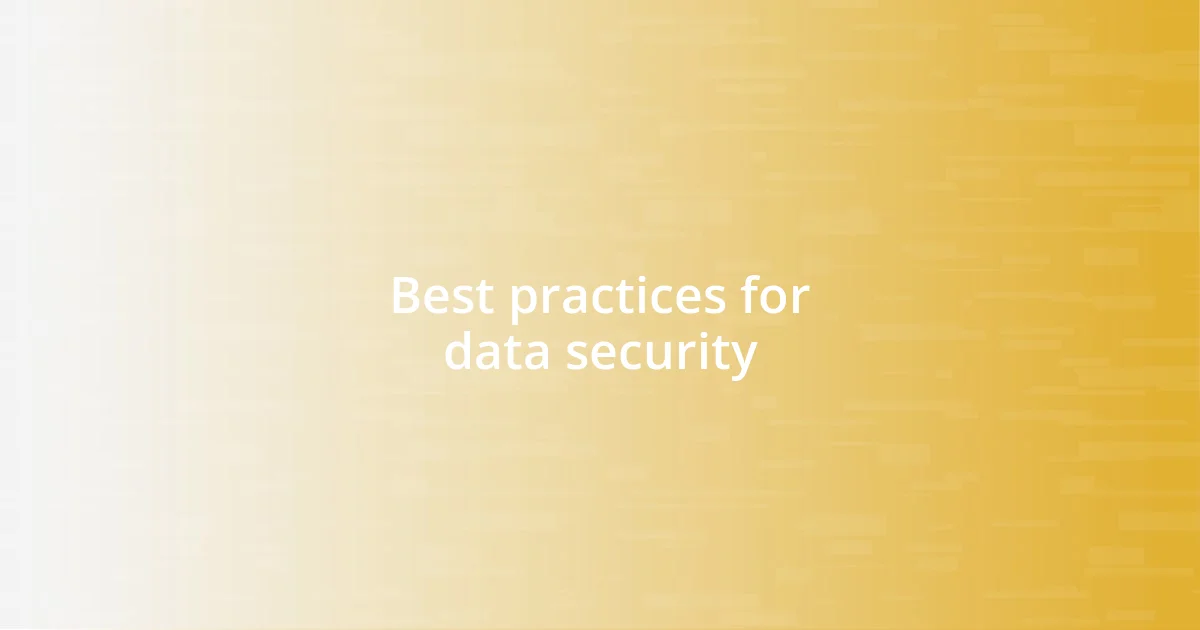
Best practices for data security
When it comes to best practices for data security, I can’t stress enough the importance of using strong, unique passwords. I remember a time when I used the same password for multiple accounts; it felt convenient until one of those accounts got hacked. Suddenly, I was staring at the daunting prospect of someone having access to all my personal information. Now, I utilize a password manager, which not only generates complex passwords but also keeps them secure—it’s like having a digital vault for my most sensitive data.
Two-factor authentication (2FA) is another must-have layer of protection that I’ve adopted. Thinking back to when I first set it up for my email, I was uncomfortable at first. It felt like an extra step, but then I realized it adds a solid barrier against unauthorized access. Now, when I log in, I feel a sense of reassurance knowing that even if my password were compromised, a secondary verification would stand in the way. Isn’t it comforting to know there’s an added layer of security keeping your information safe?
Additionally, I’ve made it a habit to regularly update my software and applications. I vividly recall a close call when an outdated app left my device vulnerable to malware. After that experience, I understood that those updates are not mere annoyances; they often contain critical security patches that protect us from emerging threats. So, I ask you, when was the last time you updated your devices? Taking just a few moments to check can save you from potential headaches down the road.
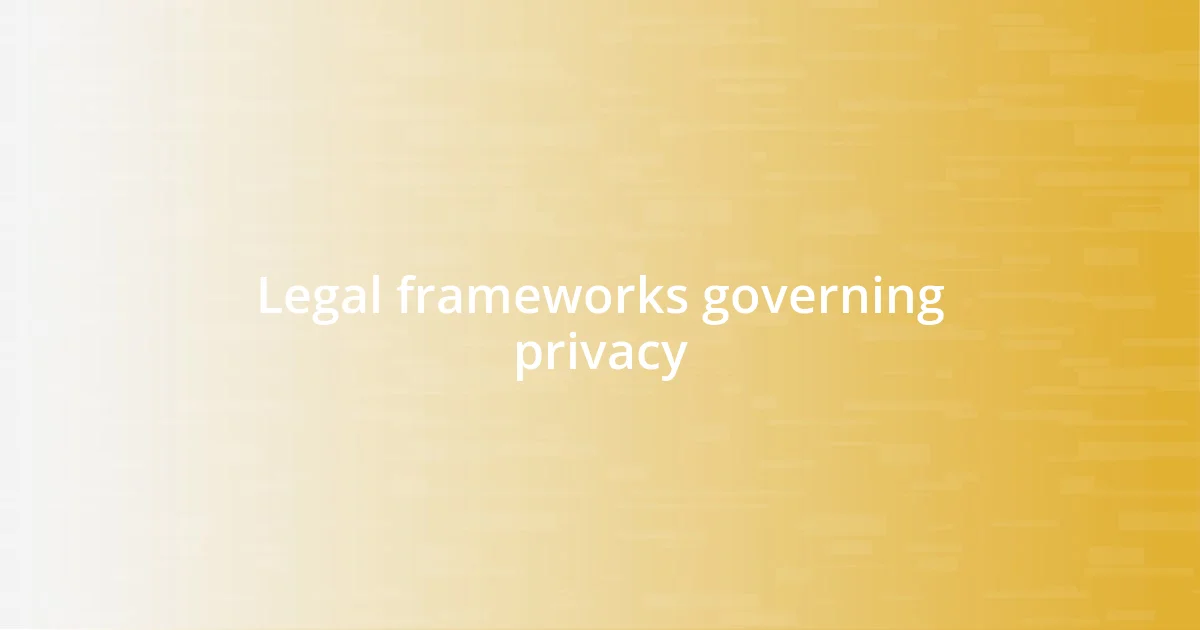
Legal frameworks governing privacy
When we think about legal frameworks governing privacy, it’s fascinating to see the diversity of laws that exist around the world. For instance, the General Data Protection Regulation (GDPR) in the European Union is often hailed as a benchmark for privacy legislation, emphasizing individuals’ rights to control their personal data. I remember how surprised I was to learn about the extensive rights GDPR grants, which made me reassess how companies handle my information.
In the United States, the approach is quite different, with various state laws like California’s Consumer Privacy Act (CCPA) stepping up where federal laws fall short. This patchwork of regulations can be confusing; I often wonder how individuals can truly navigate their rights when they vary so significantly from one state to another. It hits home when I reflect on how often I’ve had to adapt my data-sharing habits depending on where I am living or working.
Moreover, emerging technologies pose unique challenges for these legal frameworks. I recall a discussion I had with a friend who works in tech; we debated whether traditional laws are keeping pace with advancements like artificial intelligence. How do we ensure privacy when algorithms can process personal data at lightning speed? It’s a question that lingers in my mind as I consider the balance between innovation and protection in our rapidly evolving digital landscape.
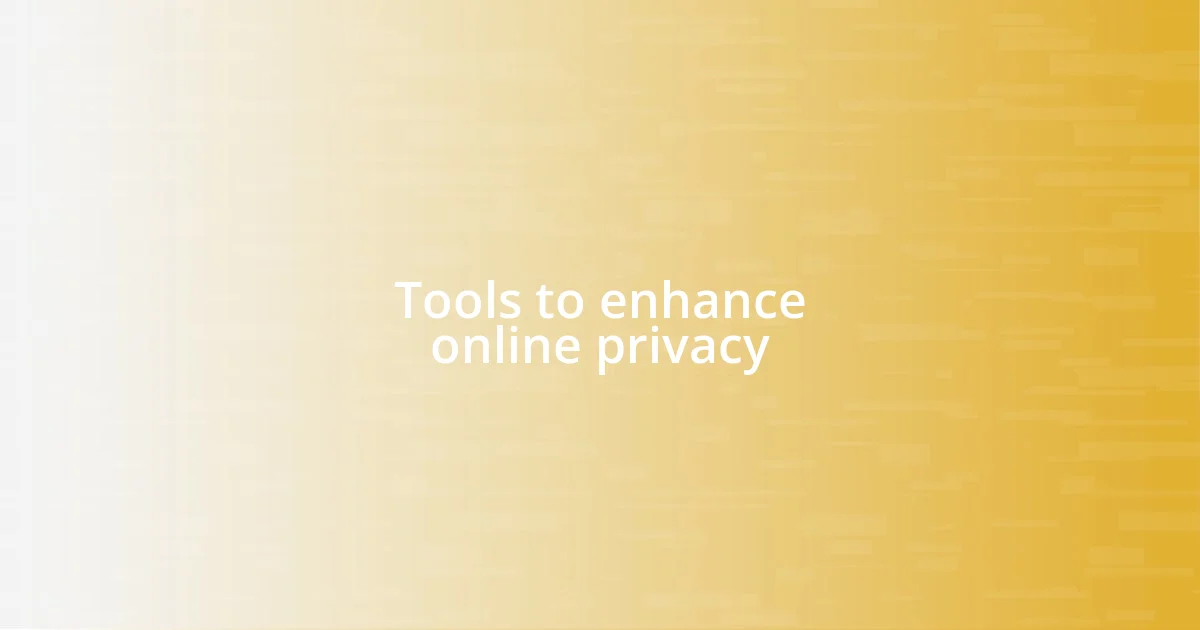
Tools to enhance online privacy
When it comes to enhancing online privacy, one tool I swear by is a Virtual Private Network (VPN). I remember the first time I connected to public Wi-Fi at a café; I felt a sudden wave of vulnerability as I imagined prying eyes potentially intercepting my data. But once I started using a VPN, it felt like surfing the web incognito. Now, I can browse without the constant fear of hackers lurking nearby. Have you ever wondered how protected your information really is on public networks?
Browser extensions like Privacy Badger or HTTPS Everywhere have also made a significant difference in my online habits. Once, I was shocked to discover just how many trackers were following my movements online. That’s when I decided to install Privacy Badger, and it felt like gaining control over my digital footprint. I now browse with the knowledge that I’m less susceptible to unwanted tracking. Have you taken steps to limit how much companies can learn about you?
Lastly, I can’t overlook the importance of secure messaging apps like Signal or Telegram. There was a time when I casually shared sensitive information over regular messaging, not realizing how easily it could be intercepted. Switching to Signal has been eye-opening; the end-to-end encryption gives me peace of mind that my conversations are just that—private. Have you considered how the platforms you use for communication might affect your privacy? Each of these tools contributes to a more secure online experience, making it imperative to choose wisely.
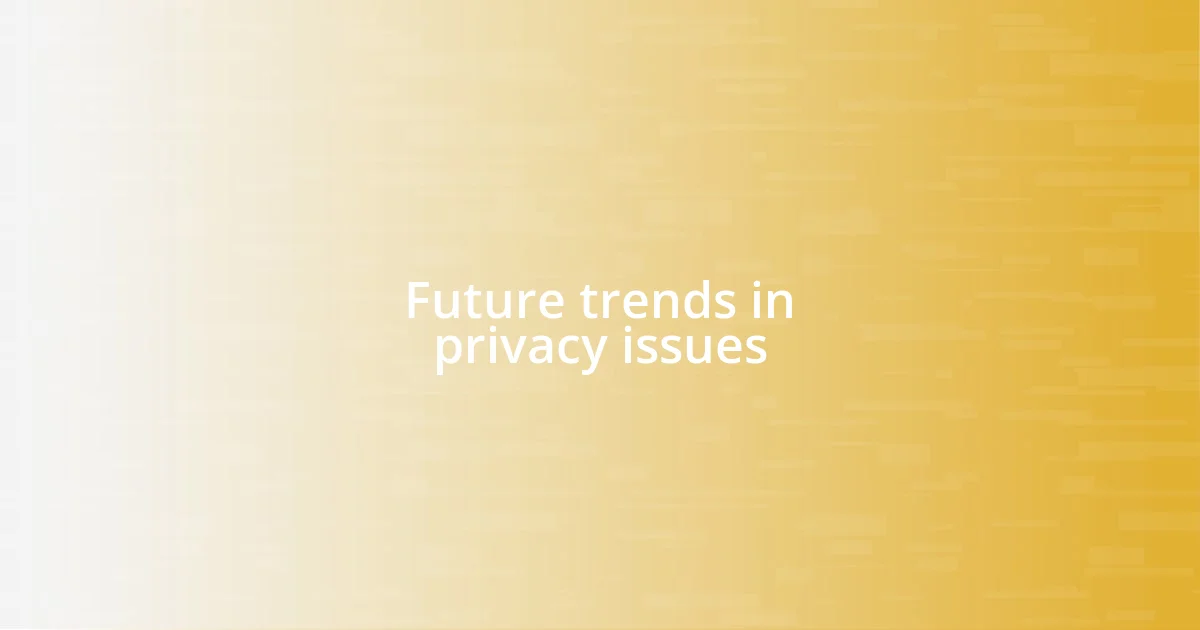
Future trends in privacy issues
As I look to the future, one trend I can’t help but notice is the growing emphasis on data transparency. Companies are beginning to realize that consumers demand to know how their data is being used, and it’s encouraging to see more businesses adopting clearer privacy policies. During a recent meeting, I remember someone saying, “If we can’t give consumers a straightforward answer about their data, we’re going to lose their trust.” Isn’t that a powerful point? It makes me reflect on how vital it is for companies to prioritize honest communication moving forward.
Another interesting development is the rise of privacy as a competitive advantage. I’ve been following startups that market themselves on their commitment to privacy, and it’s fascinating how this gives them a unique edge. I recall chatting with a friend who runs a small online business; she mentioned how her clients appreciate her rigorous privacy measures, which have fostered loyalty. Wouldn’t it be great if more companies recognized the value of embracing privacy not just as a compliance issue, but as a core part of their brand identity?
Finally, the merging of privacy with artificial intelligence is a topic I find both exciting and concerning. It’s astonishing to witness how quickly AI algorithms are being integrated into various applications, yet I can’t shake the feeling of unease when it comes to personal data processing. I had a conversation with a colleague recently about how AI could potentially analyze our habits to tailor services, but I couldn’t help but ask: at what cost does this customization come? It feels imperative that as we advance, we establish robust guidelines that protect individuals while allowing innovation to flourish.










